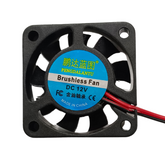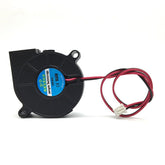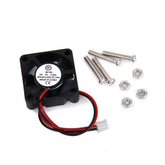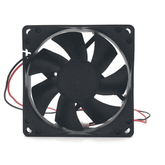Why are DC fans more efficient than AC?
Summary
Explore the dynamic world of fans through our latest blog post! We invite you to delve into the intriguing realm of AC and DC fans, as we analyze their functionalities and shed light on their unique applications. Discover the incredible advantages that DC fans offer over their AC counterparts, including exceptional energy efficiency, whisper-quiet operation, and enhanced control. Whether you are a technology enthusiast, a homeowner, or a business owner, this captivating blog will unveil the revolution in fan technology and inspire you to embrace the future. Don't miss out on this enlightening read!
Introduction
DC fans, also known as direct current fans, are electric fans that run on DC power. They are commonly used in a variety of applications, including computer cooling and ventilation systems.
In contrast, AC fans, or alternating current fans, run on AC power, which is the type of power commonly found in household outlets.

In this blog post, we will compare DC and AC fans, discussing their differences in terms of efficiency, speed control, noise level, and overall advantages.
Comparison between AC & DC fans
One of the main differences between DC and AC fans is their efficiency. DC fans are generally more efficient than AC fans because they have a simpler design and fewer components. This implies that DC fans consume less power as they lose less energy in the form of heat, compared to AC fans. Additionally, DC motors are more efficient than AC motors, which further contributes to the efficiency of DC fans.
In addition, DC fans can be more easily controlled, allowing for precise speed adjustments. This is achieved through the use of a DC motor, which can be controlled by varying the voltage applied to it. In contrast, AC fans use an AC motor, which is more difficult to control and is often limited to simple on-off switching. AC motors have a tendency to be bulkier and weigh more when compared to DC motors. Therefore, using an AC motor in a fan would increase the overall weight of the fan.
However, AC fans have the advantage of being more widely available and less expensive than DC fans. AC fans are also simpler to install, as they do not require a specialized power supply.
Another difference between DC and AC fans is the way they handle power outages. DC fans will stop running if there is a power outage, while AC fans will continue to run, as they are powered by the stored energy in the capacitor.
DC fans are also more efficient in lower voltage range and AC fans are more efficient in higher voltage range.
DC fans are also more compact and lightweight than AC fans due to the use of a DC motor.
Where are DC fans used?
DC fans are commonly used in a variety of applications, such as:
Computer cooling:
DC fans are often used in computers to cool components such as CPUs, GPUs, and power supplies. They are typically more efficient and quieter than AC fans, making them well-suited for use in computer systems.
Ventilation systems:
DC fans are used in ventilation systems to move air through buildings and other structures. They are particularly useful in energy-efficient buildings, where low power consumption is important.
Automotive applications:
DC fans are used in automobiles to cool engines, radiators, and air conditioning systems. They are also used in portable air conditioners and other devices that require cooling or ventilation.
Industrial and commercial settings:
DC fans are used in industrial and commercial settings to cool equipment and to move air through buildings. They are often used in manufacturing plants, warehouses, and other large buildings where energy efficiency is important.
Portable devices:
DC fans are used in portable devices such as laptops, tablets, and smartphones to cool down the device when it is being used for a long time.
Medical equipment:
DC fans are used in medical equipment to cool down electronic components.

In general, DC fans are used wherever low power consumption, precise speed control, and quiet operation are important.
Do DC fans change speed?
DC fans can change speed by adjusting the voltage applied to the DC motor. This allows for precise speed control and can be achieved through the use of a controller.
Are DC fans more quiet?
DC fans are typically significantly quieter than AC motors thanks to modern technology in the motors. Compared to AC fans, DC fans can consume up to 70% less energy. In general, DC fans respond to the remote control more quickly, offer more speed options, and feature a reverse function.
What are the advantages of DC fans over AC fans?
Efficiency:
DC fans are more energy efficient than AC fans because they have a simpler design and fewer components. This means that less energy is lost as heat, resulting in a lower power consumption. DC motors are also more efficient than AC motors, which is another reason why DC fans are more efficient.
Speed Control:
DC fans can be more easily controlled, allowing for precise speed adjustments. This is achieved through the use of a DC motor, which can be controlled by varying the voltage applied to it. In contrast, AC fans use an AC motor, which is more difficult to control and is often limited to simple on-off switching.
Noise Level:
DC fans can be quieter than AC fans because they have a simpler design and fewer components, resulting in less mechanical noise. Additionally, DC fans can be more easily controlled, allowing for precise speed adjustments, which can also result in less noise.
Reliability:
DC fans are generally more reliable and have a longer lifespan than AC fans. This is because DC motors have fewer moving parts, which means less wear and tear.
Compactness:
DC fans are more compact and lightweight than AC fans due to the use of a DC motor.
Low voltage operation:
DC fans are more efficient in lower voltage range than AC fans.
In conclusion, DC fans are more efficient, can be controlled precisely, are more reliable and quieter than AC fans, making them a good choice for applications where low power consumption, precise speed control and quiet operation are important.
Conclusion:
DC fans offer several advantages over AC fans, including increased efficiency, precise speed control, and a quieter operation. If you are looking for a fan that is energy-efficient, reliable, and low-noise, a DC fan might be the best option for you.
If you appreciate our work don't forget to share this post and leave your opinion in the comment box.
Please do check out other blog posts about Popular electronics
Make sure you check out our wide range of products and collections (we offer some exciting deals!)










